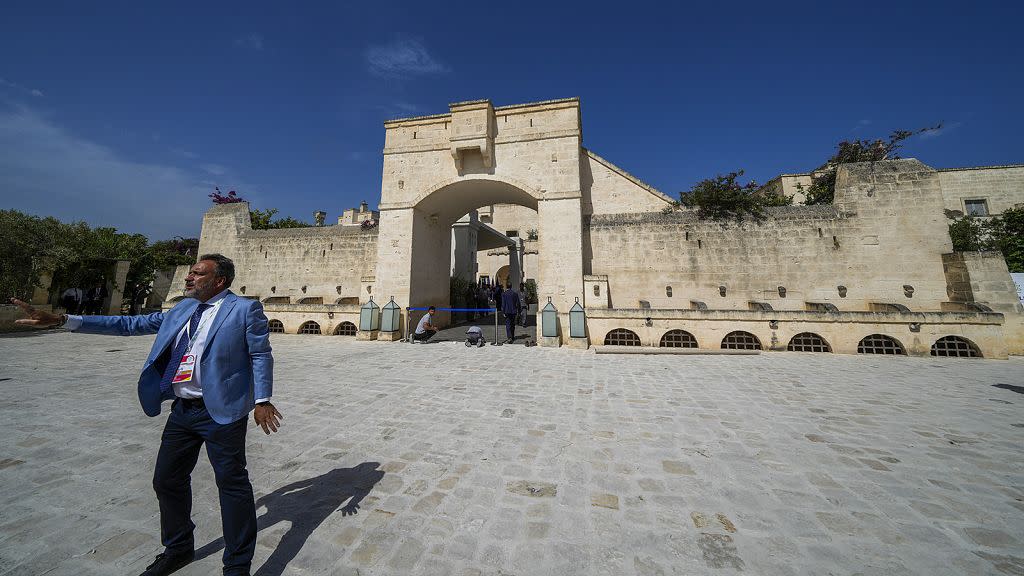From Ukraine aid to Pope Francis on AI threats: G7 kicks off in Italy

Leaders of the G7 group have agreed to engineer a €46 billion loan to help Ukraine in its fight for survival that would use interest earned on profits from Russia’s frozen central bank assets as collateral.
Diplomats confirmed that an agreement had been reached on the deal before the leaders even landed in southern Italy for the three-day summit. Ukrainian President Volodymyr Zelenskyy will be on hand and is expected to sign a separate bilateral security agreement with US President Joe Biden.
In the meantime, Pope Francis will become the first leader of the Catholic Church to address a Group of Seven summit, adding a dash of religious authority to the annual gathering being held this year in Italy's sun-drenched Puglia region.
He’ll be speaking Friday about the promises and perils of artificial intelligence but is expected to also renew his appeal for a peaceful end to wars in Ukraine and Gaza.
The G7 includes Canada, France, Germany, Italy, Japan, the UK and the US. Host Italy has invited several African leaders — Algerian President Abdelmadjid Tebboune, Kenyan President William Ruto and Tunisian President Kais Saied — to press Italy's Africa initiatives.
Other guests include Brazilian President Luiz Inácio Lula da Silva, Indian Prime Minister Narendra Modi — fresh off his own election — and Turkish President Recep Tayyip Erdogan.
With Biden, British PM Rishi Sunak, and now French President Emmanuel Macron facing elections in the coming months, the pressure is on the G7 to get done what it can while the status quo lasts.
The US proposal involves using profits from the roughly €242bn in frozen Russian central bank assets, most of them held in the European Union, to help Ukraine and issuing a €46bn loan from the US government to Kyiv, using windfall profits from the immobilized funds as collateral.
A French official, briefing reporters on Wednesday, said a political decision by the leaders had been reached but that technical and legal details of the mechanism to tap into the assets still had to be worked out.
Hungary has agreed not to veto NATO assistance to Ukraine, alliance chief says
Zelenskyy appeals for help as Russia targets Ukraine's energy grid
The issue is complicated because if the Russian assets one day are unfrozen — say if the war ends — then the windfall profits will no longer be able to be used to pay off the loan, requiring a burden-sharing arrangement with other countries.
On the eve of the summit, Washington also sent strong signals of support for Ukraine, with widened sanctions against Russia to target Chinese companies that are helping its war machine.
A strong-looking far-right
Italian Premier Giorgia Meloni goes into the meeting fortified at home and abroad after her far-right party had an even stronger showing in weekend European elections than the 2022 vote that made her Italy’s first female premier.
Known for its revolving-door governments, Italy is now in the unusual position of being the most stable power in the EU.

The leaders of the G7’s two other EU members, Germany and France, didn't fare nearly as well, rattled after hard-right parties made strong showings in the vote. Macron called a snap election, and German Chancellor Olaf Scholz saw the far-right Alternative for Germany beat out his Social Democrats.
As a result, Meloni is likely to be able to steer the three-day meeting to her key priority items as she further cements her role on the world stage, analysts said. One reported sign of her flexed far-right muscles: Meloni's office denied media reports that Italy was trying to water down language about access to abortion in the final communique.
Italy's Meloni poised to shape EU politics after strong election showing
Meloni's attempt to dilute G7 abortion declaration ires diplomats
“While it’s unlikely the recent results will radically shift the focus of the upcoming G7 Summit, this electoral win offers Premier Meloni additional leverage to frame this as an essentially ‘Mediterranean Summit,” said Nick O’Connell, deputy director of the Atlantic Council.
That includes pushing her migration agenda as Meloni seeks to leverage her program for a non-exploitative relationship with Africa to boost development while curbing illegal migration to Europe.
Italy, which has been ground zero in Europe’s migration debate for decades, has been promoting its Mattei Plan as a way to create jobs and opportunities in Africa and discourage its young people from making dangerous trips across the Mediterranean Sea.
The plan involves pilot projects in areas such as education, health care, water, sanitation, agriculture and energy infrastructure.


